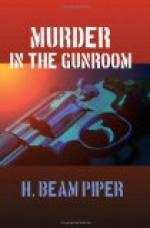Gresham was silent for a moment, then swore softly.
“My God, Jeff! This is going to raise all kinds of hell!” He was silent for a moment. “Look here, can you see me, at my home, about two thirty this afternoon? I want to talk to you about this.”
Rand smiled happily. This looked like what he had been angling for. Maybe Arnold Rivers hadn’t died in vain, after all.
“Why, yes; I can make it,” he replied.
“Good. See you there, then.”
Rand assured him that he would be on hand. When he returned to his table, he found his lunch waiting for him. He sat down and ate with a good appetite. After finishing, he had another drink, and sat sipping it slowly and smoking his pipe; going over the story Gladys Fleming had told him, and the gossip he had gotten from Carter Tipton, and the other statements which had been made to him by different people about the death of Lane Fleming, and the conclusions he had reached about the theft of the pistols, and the killing of Arnold Rivers; sorting out the inferences from the descriptions, and the descriptive statements of others from the things he himself had observed. When his glass was empty and his pipe burned out, he left a tip beside the ashtray, paid his check and went out.
He had two hours until his meeting with Stephen Gresham; he knew exactly where to spend them. The county seat was a normal twenty minutes’ drive from Rosemont, but with the road relatively free from traffic he was able to cut that to fifteen. Parking his car in front of the courthouse, he went inside.
The coroner, one Jason Kirchner, was an inoffensive-looking little fellow with a Caspar Milquetoast mustache and an underslung jaw. He wore an Elks watchcharm, an Odd Fellows ring, and a Knights of Pythias lapel-pin. He looked at Rand’s credentials, including the letter Humphrey Goode had given him, with some bewilderment.
“You’re working for Mr. Goode?” he asked, rather needlessly. “Yes, I see; handling the sale of Mr. Fleming’s pistols, for the estate. Yes. That must be interesting work, Mr. Rand. Now, what can I do for you?”
“Why, I understand you have an item from that collection, here in your office,” Rand said. “The pistol with which Mr. Fleming shot himself. Regardless of its unpleasant associations, that pistol is a valuable collector’s item, and one of the assets of the estate. If I’m to get full value for the collection, for the heirs, I’ll have to have that, to sell with the rest of the weapons.”
“Well, now, look here, Mr. Rand,” Kirchner started to argue, “that revolver’s a dangerous weapon. It’s killed one man, already. I don’t know as I ought to let it get out, where it might kill somebody else.”
Rand estimated that this situation called for a modified version of his hard-boiled act.




